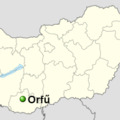Adatok
hunpron
49 bejegyzést írt és 0 hozzászólása volt az általa látogatott blogokban.
Át- is a prefix and it generally expresses movement from one point to another.
Let's see some examples!
Example 1
menni = to go
átmenni = to go over (to another point)
It you add the path (through what you are moving from one point to another), you add suffix -on/en/ön. For…..
kaptár = hive
művelődési központ
művelni = to cultivate
művelődés = "self-cultivation" = reading, attending cultural events etc.
központ = centre
művelődési központ = cultural centre
Observe the -i suffix, it makes an adjective of the noun.
If you want to say in Kaptár, it is a Kaptárban.…..
főbejárat = main entrance
fő- means main, chief, head, main, principal, first... in structures, which express that something or somebody is in a higher position.
Examples:
főorvos = chief physician
főmérnök = first engineer
főigazgató = director-general (note that we also have…..
"Because of" is miatt in Hungarian. It should be noted that miatt is a postposition, which means that it is placed after the word it governs. In the Hungarian language, we have a lot of postpositions.
Let's see a few examples:
a rossz idő miatt = because of the bad weather
a rossz idő miatt…..
Megyek dolgozni
Megyek is "I'm going", but also "I go", because we don't have a continuous tense.
Dolgozni is "to work". Note that this is not derived from the Hungarian equivalent of "work" - it's munka.
@hunpron
#work #hungary #magyar #language #hungarian
♬ original sound - Hungarian…..
hétfő = Monday
@hunpron
#language #magyar #hungarian #hungary #cartoon #car #house #phone #watch #vocabulary
♬ original sound - Hungarian Pronunciation
..
egyetérteni = to agree
We don't have an auxiliary verb equivalent to "do" in English, therefore questions and negative structures are formed in a different way.
When we want to ask the other person if they agree or not, we simply conjugate the verb and use an interrogative intonation. If it's a…..
In a previous video, we discussed that one form of introduction is the ... vagyok structure, where ... is your name. This simply means "I am ...".
The same structure can be used to express your feelings, emotions etc. For example, you may want to say "I'm happy", this will be boldog…..
kutya = dog
fekete macska = black cat
tehén = cow
kecske = goat
disznó / sertés = pig
három szamár/csacsi = three donkeys
@hunpron
#magyar #hungary #hungarian #dog #cat #cow #horse #goat #donkey #pig #vocabulary
♬ original sound - Hungarian Pronunciation..
A follower asked me to explain how to say "I live", "I will live" and "I have lived" in Budapest.
First, we use the verb élni, which means "to live".
1. I live in Budapest
The first person singular form of this verb is élek (I live). "In Budapest" is Budapesten. Here we use the -on/en/ön…..
When you have finished your meal in a restaurant, and you want to pay, you say "he bill, please" in English. Although it is possible to say this in Hungarian too, we normally say the Hungarian equivalent of "excuse me, I'd like to pay". Let's see these words.
elnézést = ecxuse me
fizetni = to…..
Ez egy = this is a...
ajtó, kilincs, kulcs, zár, lábtörlő
Pálinkát hoztál? = have you brought pálinka?
@hunpron #hungarian #magyar #words #hunpron #pálinka #door #key #language ♬ original sound - Hungarian Pronunciation..
A follower asked me to talk about the meanings of hogy.
Hogy is a short form of the question word hogyan, so it should be no surprise that hogy is used in questions like
Hogy vagy? = How are you?
Hogy mondtad? = How did you say that?
Hogy is also a conjunction, i.e. a word connecting two…..
A follower asked me about the word sajnálom.
While sajnálom is also a word that expresses "I am sorry", there is a clear difference when compared with bocsánat, elnézést, or ne haragudj. These three are appropriate when you have made a mistake or hurt somebody.
Sajnálom expresses your empathy and…..
A follower asked me to explain how we say "I'm sorry".
There are several ways of saying "I'm sorry", but now we'll talk about three.
1. Bocsánatot kérek
Bocsánat is something like "forgiveness", so this sentence means "I am asking for forgiveness". It is very common only to say bocsánat,…..
Hát, which is similar to well in English is a commonly used word in Hungarian. It belongs to the word family called discourse markers. Although its use is often stigmatized, it is an essential component of spoken language since it effectively expresses the attitudes or feelings of the speaker…..
sötét = dark
Este sötét van = It's dark in the evening
Éjszaka sötét van = it's dark in the night
You can also say éjjel instead of éjszaka, it's the same.
@hunpron
#dark #evening #night #hungary #hungarian #magyar
♬ original sound - Hungarian Pronunciation..
A follower asked me to talk about the differences between így and ilyen.
Így means "this way", so basically it describes how an action is performed. Therefore, it is used with verbs.
Ilyen means "like this", and it is used with nouns, adjectives and adverbs.
Examples with English…..

I visited a lake, which is located near a village called Orfű, in the South-Western part of the country.
There are two ways of saying (actually, better to say: writing) "the lake of Orfű".
1. If we want to say that we have visited the lake, which is located near Orfű, we can talk about orfűi…..
Let's first collect the words.
látni = to see
láttam = 1st person singular form in past tense, i.e. I saw
egy = a, an
macska = cat
Before constructing the sentence, we need to note that the verb látni has an object: látni valamit = to see something. It is a general rule in Hungarian that…..

In a shopping centre, I saw this:
Mobiltelefon should not be a problem for a language learner, but what about szaküzlet?
üzlet = business, shop
And szak?
Szak- means that something or somebody is specialized in something. For example, szaküzlet is a shop, which is specialized in selling…..
A follower asked me to talk about "alanyi" and "tárgyas" conjugations.
My channel is devoted to discussing basic grammar, simple expressions and pronunciation excercises, and this request addresses a more complex topic, which -- at least I think -- should be taught at least at intermediate level,…..
We use two words for "two": kettő and két.
Although they both mean the same, there is a little difference between their uses.Let's see some examples.
(1)
Q: Hány autó van az utcán? = How many cars are there in the street?
A: Kettő. = Two.
You can see that kettő is alone here with no…..
Ez egy... = This is a...
számítógép = computer
egér = mouse
monitor = monitor
billentyűzet = keyboard
nyomtató = printer
szkenner = scanner
két hangszóró = two speakers
The word számítógép consists of two parts: számító + gép. Számító means "computing" or "computer" (számítani = "to…..
Jó reggelt!
jó = good
reggel = morning
As you can see, there is a -t suffix (reggelt), because reggel is the object in this sentence and the -t suffix (accusative case) should be used with the object. In this case, the object belongs to the verb kívánni (to wish something - this something is…..
Belépve többet láthatsz. Itt beléphetsz
